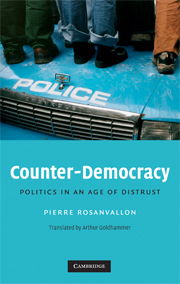Book contents
- Frontmatter
- Contents
- Foreword
- Introduction
- Part 1 Overseeing democracy
- Part 2 The sovereignty of prevention
- Part 3 The people as judge
- Part 4 Unpolitical democracy
- 11 The sense of powerlessness and symbols of depoliticization
- 12 The populist temptation
- 13 Lessons of unpolitical economy
- 14 Conclusion: the modern mixed regime
- Index
- References
12 - The populist temptation
Published online by Cambridge University Press: 24 May 2010
- Frontmatter
- Contents
- Foreword
- Introduction
- Part 1 Overseeing democracy
- Part 2 The sovereignty of prevention
- Part 3 The people as judge
- Part 4 Unpolitical democracy
- 11 The sense of powerlessness and symbols of depoliticization
- 12 The populist temptation
- 13 Lessons of unpolitical economy
- 14 Conclusion: the modern mixed regime
- Index
- References
Summary
With a meaning as vague as it is ominous, the term “populism” has gained currency in today's political lexicon. Borrowed from Russian, where it first appeared toward the end of the nineteenth century, the word is now widely used to refer to a range of political movements and issues that cannot easily be accommodated within the usual ideological categories. It was regularly applied to a range of extreme right-wing political movements that gained followings in late twentieth-century Europe (and, earlier, to Latin American regimes such as Juan Perón's in Argentina), yet these instances do not exhaust its meaning. To describe a movement as “populist” is to suggest that it is in some way pathological or a danger to liberty without specifying what the nature of the pathology is. In other words, “populism” is a word that serves as both a screen and a crutch. One way to make the term less ambiguous is to think of populism as a democratic pathology in two senses: as a pathology, first, of electoral-representative democracy and, second, of counter-democracy. Populism is not just an ideology. It is a perverse inversion of the ideals and procedures of democracy.
A pathology of electoral-representative democracy
Let us begin by considering the tensions inherent in democratic political representation. Populism claims to resolve the problem of representation by conjuring up an image of a unified, homogeneous people. It radically rejects whatever it assumes to be inimical to such unity and homogeneity: foreigners, enemies, oligarchy, elites.
- Type
- Chapter
- Information
- Counter-DemocracyPolitics in an Age of Distrust, pp. 265 - 273Publisher: Cambridge University PressPrint publication year: 2008
References
- 4
- Cited by

